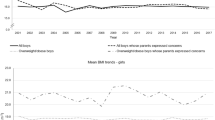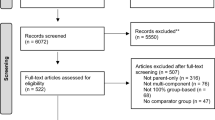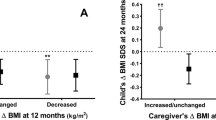Abstract
Objectives:
To investigate parents’ perceptions of weight status in children and to explore parental understanding of and attitudes to childhood overweight.
Design:
Questionnaires and focus groups within a longitudinal study.
Subjects:
536 parents of Gateshead Millennium Study children, of which 27 attended six focus groups.
Main outcome measures:
Parents’ perception of their child's weight status according to actual weight status as defined by International Obesity Taskforce (IOTF) cutoffs. Focus group outcomes included parental awareness of childhood overweight nationally and parental approaches to identifying overweight children.
Results:
The sensitivity of parents recognising if their child was overweight was 0.31. Prevalence of child overweight was underestimated: 7.3% of children were perceived as ‘overweight’ or ‘very overweight’ by their parents, 23.7% were identified as overweight or obese using IOTF criteria. 69.3% of parents of overweight or obese children identified their child as being of ‘normal’ weight. During focus groups parents demonstrated an awareness of childhood overweight being a problem nationally but their understanding of how it is defined was limited. Parents used alternative approaches to objective measures when identifying overweight in children such as visual assessments and comparisons with other children. Such approaches relied heavily on extreme and exceptional cases as a reference point. The apparent lack of relevance of childhood overweight to their child's school or own community along with scepticism towards both media messages and clinical measures commonly emerged as grounds for failing to engage with the issue at a personal level.
Conclusion:
Parents’ ability to identify when their child was overweight according to standard criteria was limited. Parents did not understand, use or trust clinical measures and used alternative approaches primarily reliant on extreme cases. Such approaches underpinned their reasoning for remaining detached from the issue. This study highlights the need to identify methods of improving parental recognition of and engagement with the problem of childhood overweight.
This is a preview of subscription content, access via your institution
Access options
Subscribe to this journal
Receive 12 print issues and online access
$259.00 per year
only $21.58 per issue
Buy this article
- Purchase on Springer Link
- Instant access to full article PDF
Prices may be subject to local taxes which are calculated during checkout
Similar content being viewed by others
References
Doak CM, Visscher TLS, Renders CM, Seidell JC . The prevention of overweight and obesity in children and adolescents: a review of interventions and programmes. Obes Rev 2006; 7: 111–136.
Brown M, Byatt T, Marsh T, McPherson K . Obesity trends for children aged 2–11: analysis from the Health Survey for England 1993–2007. National Heart Forum 2009. Available from http://nhfshare.heartforum.org.uk/RMAssets/NHFreports/Child_obesity_policy_long_Oct_09.pdf (accessed on 8 February 2010).
Mulvihill C, Quigley R . The Management of Obesity and Overweight: An Analysis of Reviews of Diet, Physical Activity and Behavioural Approaches. Health Development Agency: London, 2003.
Rhee KE, De Lago CW, Arscott-Mills T, Mehta SD, Krysko Davis R . Factors associated with parental readiness to make changes for overweight children. Pediatrics 2005; 116: e94–e101.
Parry LL, Netuveli G, Parry J, Saxena S . A systematic review of parental perception of overweight status in children. J Ambulatory Care Manage 2008; 31: 253–268.
Doolen J, Alpert PT, Miller SK . Parental disconnect between perceived and actual weight status of children: a metasynthesis of the current research. J Am Acad Nurse Pract 2009; 21: 160–166.
Towns N, D’Auria J . Parental perceptions of their child's overweight: an integrative review of the literature. J Pediatr Nurs 2009; 24: 115–130.
Wright CM, Parkinson KN, Drewett RF . The influence of maternal socioeconomic and emotional factors on infant weight gain and weight faltering (failure to thrive): data from a prospective birth cohort. Arch Dis Child 2006; 91: 312–317.
Parkinson KN, Pearce MS, Dale A, Reilly JJ, Drewett RF, Wright CM et al. Cohort profile: the Gateshead Millennium Study. Int J Epidemiol 2011; 40: 308–317.
Parkinson KN, Wright CM, Drewett RF . The Gateshead Millennium Baby Study: a prospective study of feeding and growth. Int J Soc Res Meth 2007; 10: 335–347.
Carnell S, Edwards C, Croker H, Boniface D, Wardle J . Parental perceptions of overweight in 3–5 y olds. Int J Obes 2005; 29: 353–355.
Jones AR, Hyland RM, Parkinson KN, Adamson AJ . Developing a focus group approach for exploring parents’ perspectives on childhood overweight. Nutr Bull 2009; 34: 214–219.
Cole TJ, Bellizzi MC, Flegal KM, Dietz WH . Establishing a standard definition for child overweight and obesity worldwide: international survey. Br Med J 2000; 320: 1240–1243.
Cole TJ, Flegal KM, Nicholls D, Jackson AA . Body mass index cut offs to define thinness in children and adolescents: international survey. Br Med J 2007; 335: 194–197.
Johnson F, Cooke L, Croker H, Wardle J . Changing perceptions of weight in Great Britain: comparison of two population surveys. Br Med J 2008; 337: a494.
Bossink-Tuna HN, L’Hoir MP, Beltman M, Boere-Boonekamp MM . Parental perception of weight and weight-related behaviour in 2- to 4-year-old children in the eastern part of the Netherlands. Eur J Pediatr 2009; 168: 333–339.
Jeffery AN, Voss LD, Metcalf BS, Alba S, Wilkin TJ . Parents’ awareness of overweight in themselves and their children: cross sectional study within a cohort (EarlyBird 21). Br Med J 2005; 330: 23–24.
Parkinson KN, Drewett RF, Jones AR, Dale A, Pearce MS, Wright CM et al. When do mothers think their child is overweight? Int J Obes 2011; 35: 510–516.
Goodell LS, Pierce MB, Bravo CM, Ferris AM . Parental perceptions of overweight during early childhood. Qual Health Res 2008; 18: 1548–1555.
Jain A, Sherman SN, Chamberlin LA, Carter Y, Powers SW, Whitaker RC . Why don’t low-income mothers worry about their preschoolers being overweight? Pediatrics 2001; 107: 1138–1146.
Rich SS, DiMarco NM, Huettig C, Essery EV, Andersson E, Sanborn CF . Perceptions of health status and play activities in parents of overweight Hispanic toddlers and preschoolers. Fam Community Health 2005; 28: 130–141.
Booth ML, King LA, Pagnini DL, Wilkenfeld RL, Booth SL . Parents of school students on childhood overweight: the weight of opinion study. J Paediatr Child Health 2009; 45: 194–198.
Donnelly L . Children's clothes sizes to be changed to cope with obesity epidemic. Available from: http://www.telegraph.co.uk/health/children_shealth/4623025/Childrens-clothes-sizes-to-be-changed-to-cope-with-obesity-epidemic.html (Accessed on 23 July 2009).
Department of Health. Healthy Weight, Healthy Lives: Consumer Insight Summary. Department of Health: London, 2008.
Basterfield L, Adamson AJ, Parkinson KN, Maute U, Li PX, Reilly JJ et al. Surveillance of physical activity in the UK is flawed: validation of the health survey for England physical activity questionnaire. Arch Dis Child 2008; 93: 1054–1058.
Acknowledgements
The Gateshead Millennium Study is supported by a grant from the National Prevention Research Initiative (incorporating funding from British Heart Foundation; Cancer Research UK; Department of Health; Diabetes UK; Economic and Social Research Council; Food Standards Agency; Medical Research Council; Research and Development Office for the Northern Ireland Health and Social Services; Chief Scientist Office, Scottish Government Health Directorates; Welsh Assembly Government and World Cancer Research Fund). The cohort was first established with funding from the Henry Smith Charity and Sport Aiding Research in Kids (SPARKS) and followed up with grants from Gateshead NHS Trust R&D, Northern and Yorkshire NHS R&D, and Northumberland, Tyne and Wear NHS Trust. We acknowledge the support of an External Reference Group in conducting the study. We appreciate the support of Gateshead Health NHS Foundation Trust, Gateshead Education Authority and local schools. We warmly thank the research team for their effort. Thanks are especially due to the Gateshead Millennium Study families and children for their participation in the study.
Author information
Authors and Affiliations
Consortia
Corresponding author
Ethics declarations
Competing interests
The authors declare no conflict of interest.
Rights and permissions
About this article
Cite this article
Jones, A., Parkinson, K., Drewett, R. et al. Parental perceptions of weight status in children: the Gateshead Millennium Study. Int J Obes 35, 953–962 (2011). https://doi.org/10.1038/ijo.2011.106
Received:
Revised:
Accepted:
Published:
Issue Date:
DOI: https://doi.org/10.1038/ijo.2011.106
Keywords
This article is cited by
-
Parents’ perceptions of their child’s weight among children in their first year of primary school: a mixed-methods analysis of an Australian cross-sectional (complete enumeration) study
International Journal of Obesity (2022)
-
Is children’s weight a public health or a private family issue? A qualitative analysis of online discussion about National Child Measurement Programme feedback in England
BMC Public Health (2018)
-
Assessing Child Body Mass Index Perceptions Among African American Caregivers in a Rural Community
Journal of Racial and Ethnic Health Disparities (2018)
-
Factors that Influence Parental Misperception of Their Child’s Actual Weight Status in South Carolina
Maternal and Child Health Journal (2018)
-
Perceptions of overweight by primary carers (mothers/grandmothers) of under five and elementary school-aged children in Bandung, Indonesia: a qualitative study
International Journal of Behavioral Nutrition and Physical Activity (2017)



